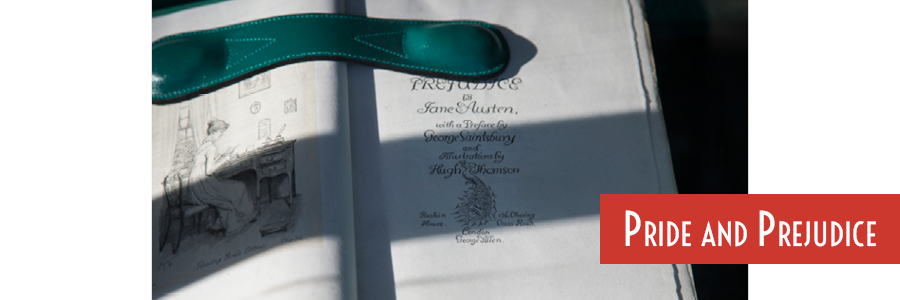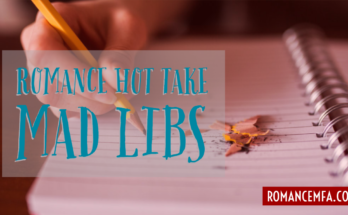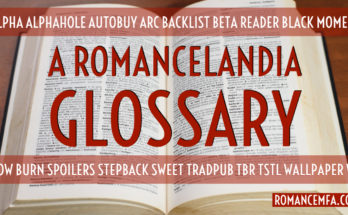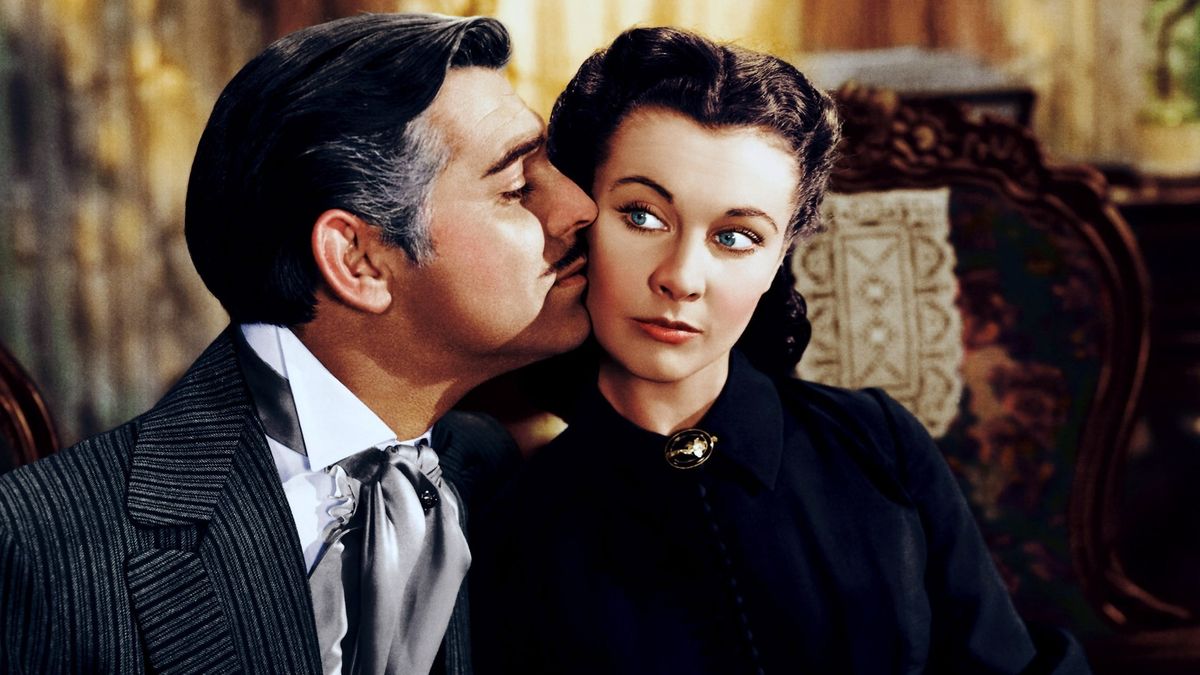In our second syllabus reading, let’s do a quick rundown on Austen’s classic novel then look for romance genre tropes in Pride and Prejudice.
Book details:
Title: Pride and Prejudice
Author: Jane Austen
Original publication date: 1813
Setting time & place: Early 19th century England, country estates in Hertfordshire, Kent & Derbyshire as well as London
He is… a rich man of good breeding, unmarried in his late twenties, intelligent but socially awkward and viewed with prejudice on account of his apparent pride.
She is… an intelligent young woman, attached to her eldest sister, prejudiced for or against others depending on whether they’ve salved or wounded her pride.
Reasons to read this title: Well, you’ve probably already read it, but if not–most everyone loves it, so you probably will too. Also important for cultural literacy, since so many people love it.
My review of Pride and Prejudice
Is it a romance novel? Yes, absolutely. Obstacles are overcome and we end with two (four if you include Jane/Bingley) characters sharing wedded bliss.
Is it a must read romance novel? Yes. While Pamela was—past tense—a cultural phenomenon, Pride and Prejudice is a cultural phenomenon, present continuing.
Wikipedia has separate pages for film/theatre/television adaptations and for literary adaptations. An Amazon search for “pride and prejudice variations” will fill your Kindle for life with retellings of all flavors: modern, erotic, Egyptian…many written by the authors collaborating at Austenauthors.net. Google’s autocomplete just let me know that there’s a current theatre production here in Seattle, and there are reports of a new movie being made for release in 2020.
In the demographic of women with a passing interest in books and romance, I don’t think I’m alone in having read Pride and Prejudice at least twice. The last time was probably a decade ago, but I found two quotes more than passingly familiar because they are reused so often.
The opening line, for instance, is right up there with “Call me Ishmael” for recognizability.
IT IS A TRUTH universally acknowledged that a single man in possession of a good fortune must be in want of a wife.
Austen has one up on Melville, though, in summarizing an entire genre in that classic line. How many romances, historical, contemporary, or other subgenres, center around a rich hero and the woman who will become his wife?
Darcy’s first amorous declaration is also eminently quotable.
You must allow me to tell you how ardently I admire and love you.
Anyway, let’s look for romance genre tropes in Pride and Prejudice–that’s the Romance MFA is here for!
1. No one’s ever told him no.
Since that romantic line above is often shown without any context, I’ll take this moment to remind you that Darcy shows up to press his suit just when Elizabeth has been thinking how unhappy he has deliberately made her sister by “saving” Bingley from an unfortunate marriage. And he follows up that romantic sounding statement with some commentary on how terrible her family and social status is—basically saying “You?! I cannot believe I have fallen in love with you!”
And Elizabeth has an excellent response, given that she’s a Witty Heroine: Certainly all the reasons you’ve given why you shouldn’t love me are quite strong, so I’m sure you will get over it. kthxbai!
The supreme arrogance and presumption on Darcy’s part in this scene—it never occurred to him that she would be other than flattered by his attention—sets him up for another classic piece of a romance story…
2. The Grovel.
He’s got to make a grand gesture to make up for that jerkitude, and therefore, as we eventually learn, he takes steps to make things right with Lydia and Wickham. (Or rightish–as annoying as Lydia is, does she really deserve to be hitched to Wickham for life?)
3. She doesn’t consider him a romantic possibility.
It’s true that Mr. Darcy is physically attractive–when he first comes on the scene everyone notes “his fine, tall person, handsome features, [and] noble mien”, but after the “tolerable” comment, there’s no way Elizabeth can ever consider him as a marriage prospect. Add that to his tally for the Grovel.
4. The Spiteful Other Woman.
Caroline Bingley. She is so obvious and Darcy is so patient with her. She thinks she’s got a sure thing going and the reader knows she’s all wrong, but we have to see what wrenches she’s going to throw into the works.
5. The Marriage-Minded Mama.
Surely every following Marriage-Minded Mama owes a great deal to Mrs. Bennet! She is the Ur-Mother of Marriage-Minded Mothers.
6. I Can Control My Heart.
Darcy internally acknowledges his attraction to her—and therefore resolves to ignore her studiously. Good luck with that!
7. The Witty Heroine.
Like so many heroines, Elizabeth has got a mouth on her. Or at least a pen. When she’s hanging with Wickham she particularly delights in making remarks, and her verbal battle with Lady Catherine is a tour de force. As with Pamela I see this as a the main defense a woman has in this context: she’s not going to engage in fisticuffs or get in a duel, so barbed witticisms is the default weapon for a woman. Unless Jane Austen’s Fight Club was ever really a thing.
8. He is so rich. So incredibly rich.
Ten thousand a year! Just think of it. *fans self* As Mrs. Bennet says when she learns of her daughter’s engagement,
What pin-money, what jewels, what carriages you will have!
What did I miss? Let me know what romance tropes you see in Pride and Prejudice in the comments.



